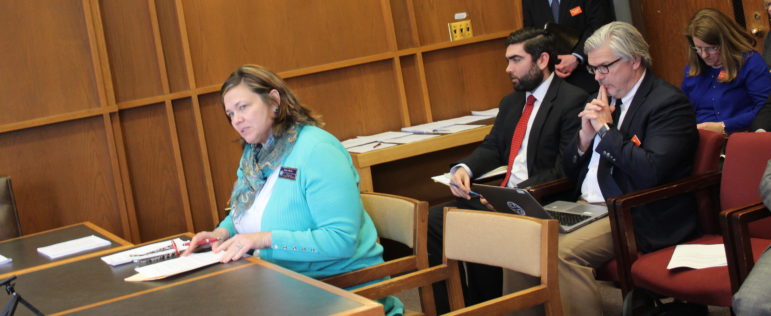Subscribe to our free Friday weekly news updates, Sunday weekender features and breaking news alerts here.
By Nancy West, InDepthNH.org
CONCORD – Criticism mounted against the Secure Psychiatric Unit at NH State Prison for Men Tuesday as members of the Senate Health and Human Services Committee heard complaints about the lack of treatment there.
The committee was hearing testimony on House Bill 1565 submitted by state Rep. Renny Cushing, D-Hampton, to require the Secure Psychiatric Unit to seek accreditation by the Joint Commission as a psychiatric hospital.
Sen. Kevin Avard, R-Nashua, who serves on the committee, listened to concerns and complaints about the unit where 55 men and three women are currently held under the direction of the Department of Corrections on the grounds of the state prison.
Avard said SPU, as it is often called, sounded like something out of a “horror movie.”
“It sounds very tragic,” said Avard, who stopped to talk with family members and SPU critics after the hearing suggesting that accreditation would be a good start to make changes there.

Registered Nurse Beatrice Coulter testifies Tuesday in favor of House Bill 1565.
House Bill 1565 is the latest in Rep. Cushing’s attempts over the years to require the Secure Psychiatric Unit to stop incarcerating civilly committed people who have mental illness who haven’t been convicted of a crime with mentally ill criminals at the unit. He said 30 years is too long to continue the practice, which he insists is unconstitutional.
Beatrice Coulter, a registered nurse who became an outspoken critic of the unit after working there for only a few days before quitting in disgust, testified that housing civilly committed people with mental illness with criminals in prison violates the Constitution and the Americans With Disabilities Act.
“The Secure Psychiatric Unit is not a licensed facility,” Coulter said. When the state brings civilly committed people into a prison, the rules change and nurses and all licensed personnel have a decision to make, she told the committee.
“Do you stay and become complicit because where I come from I could not knowingly and repeatedly (accept) civil rights violations of some of our most vulnerable citizens,” Coulter said.
A woman who asked not to be identified to the committee because she feared her nephew would face retaliation if it became known she was complaining about his treatment at SPU, said she worries about his safety there.
She told the committee that she is all he has for family. She said the officers would take away the possessions that he enjoys most to punish him and she wouldn’t say what those are in case it would identify him.
She questioned why he should be shackled and imprisoned for being mentally ill.
Eric Largy of Nashua told of nearly dying as a result of the lack of medical care when he was held at the Secure Psychiatric Unit for 5 1/2 years after being found not competent to stand trial.
Largy was found not competent to stand trial in the alleged beating of his father, former Nashua Police Chief Clifton Largy. Ciminal charges were reinstated after Largy was released two years ago, but Judge Charles Temple dropped them telling Largy he hoped “this case is over for you at this point.”

Nancy West photo
State Rep. Renny Cushing, D-Hampton, is pictured at the far right, front row, as testimony is heard on House Bill 1565
At Tuesday’s hearing, Largy said he was locked in his cell overnight after he was denied medical help, suffered an aortic dissection and nearly died.
“I was in a totally distressed situation, They wouldn’t give me anything,” Largy said.
He was finally taken to Concord Hospital after 12 hours and then flown by helicopter to Dartmouth-Hitchock Medical Center where he was shackled to his bed.
After being sent back to the unit, Largy said he ended up back at Dartmouth-Hitchcock for blood transfusions.
“The conditions in the medical department at SPU are a joke. The inmates clean it. There’s dust all over the vents,” Largy said.
He said an investigation by the Disabilities Rights Center of the state’s psychiatric system didn’t include the Secure Psychiatric Unit.
Four days ago, however, Disabilities Rights Center Attorney Andrew Milne said he has been monitoring SPU, which could lead to an investigation.
“We do have concerns about the appropriateness of that setting for individuals with mental illness – in particular individuals who have not been convicted of any crime who are nevertheless placed there in a prison setting under the Department of Corrections’ control, which we question the therapeutic value of and the effectiveness of the mental health treatment,” Milne said.

Nancy West photo
Paula Mattis, director of medical and forensic services at the Department of Corrections.
The DRC also filed a federal lawsuit last month seeking access to the death investigation of Phillip Borcuk, 34, who died while being held at the Residential Treatment Unit, which is upstairs from the Secure Psychiatric Unit, at the State Prison for Men.
Milne said the Department of Corrections has turned over some, but not all records of Borcuk’s death investigation and the federal court case continues.
Paula Mattis, director of medical and forensic services at the Department of Corrections, said she has 30 years experience and formerly worked at the New Hampshire Hospital, the state’s psychiatric hospital.
She said the unit serves many masters, but it is the policy makers who decide which patients will be held there.
“Nobody knocks on the door – and this has been tried – and gains admission to the Secure Psychiatric Unit. There are safeguards in place,” Mattis said. “Even when transfers come to us from New Hampshire Hospital, there is a process.”

Alexander P. de Nesnera, MD, chief medical officer of the New Hampshire Hospital was asked to testify Tuesday as lawmakers consider House Bill 1565.
She reviews every transfer, Mattis said. “If I don’t think it is appropriate, I will not sign off on it,” Mattis said.
The last three transfers from New Hampshire Hospital involved patients who had acted violently against staff or another patient, she said.
Mattis said she welcomes accreditation, but didn’t think the Joint Commission was the appropriate oversight organization.
Alexander P. de Nesnera, MD, chief medical officer of the New Hampshire Hospital, was invited by the committee to testify. He said the hospital, which is under the Department of Health and Human Services, works with the Secure Psychiatric Unit, which is under the Department of Corrections, before transfers back and forth take place.
Arnie Alpert, co-director of the American Friends Service Committee’s NH Program, commented after listening to testimony.
“This is no way to treat anyone, whether they are civilly committed or criminally convicted,”Alpert said.
NH Disability Rights Center Monitoring Complaints Against Secure Psychiatric Unit





